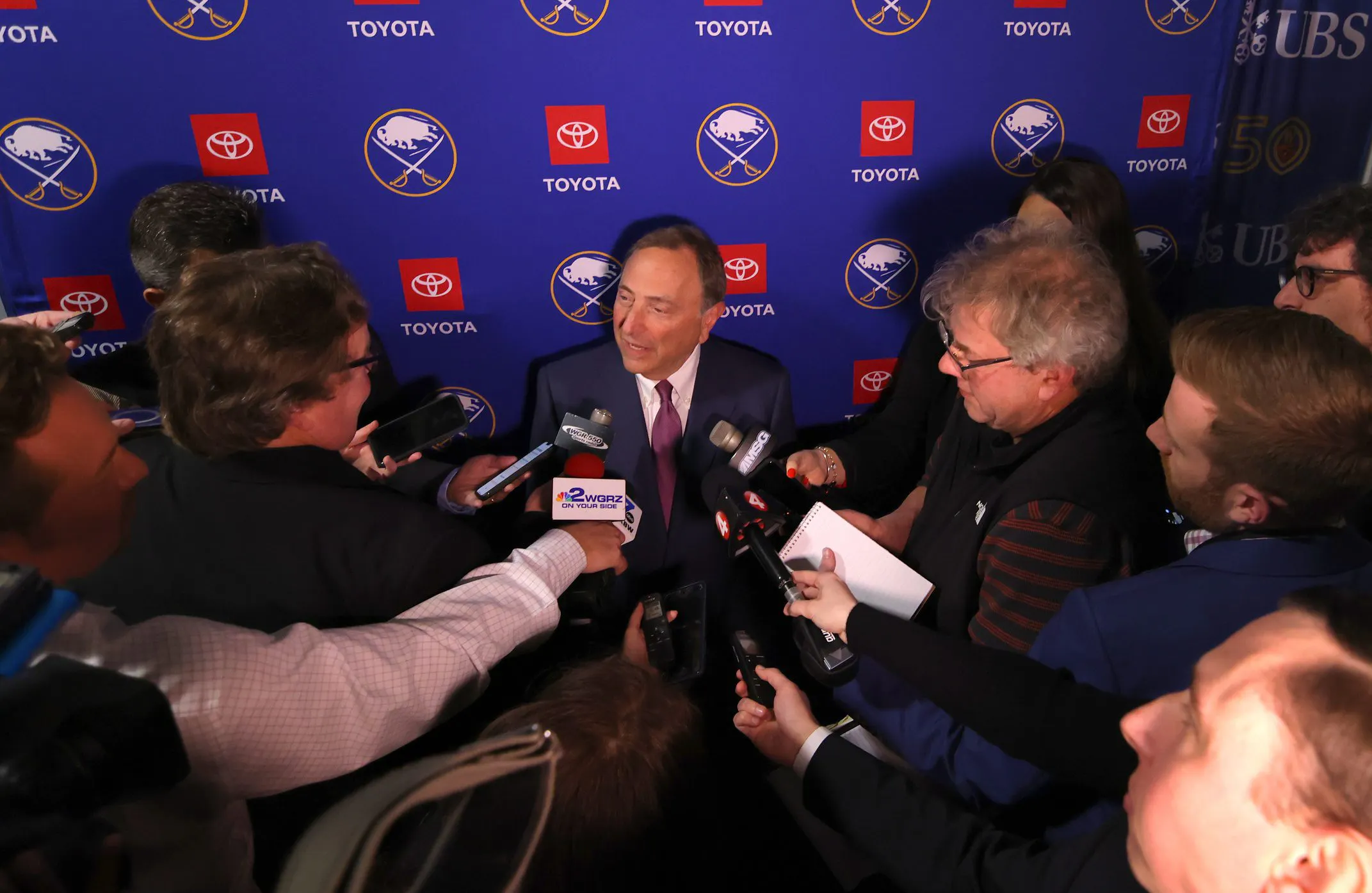NHL says expanding to 34 teams is “not a priority right now”

We’ve all seen the tweets. They’ve gotten everyone stirring, even daydreaming about the possibility of 34 NHL franchises.
In recent days, ESPN personalities John Buccigross and Kevin Weekes have created buzz in the hockey world by dropping breadcrumbs on Twitter with images of Houston and Atlanta, along with a few cryptic emojis and logos. ESPN is the NHL’s largest media rightsholder in the United States, so the question has been: What does ESPN know that the rest of the hockey world does not? Why the cryptic tweets?
“I don’t know,” NHL deputy commissioner Bill Daly wrote in an email to Daily Faceoff. “No change in position on this end.”
Is the NHL ready to consider expanding again after installing the Seattle Kraken as the league’s 32nd franchise in 2021? The answer is no, according to Daly.
“Expansion isn’t our priority right now,” Daly wrote. “But it doesn’t mean we won’t listen to people or groups who have interest. That happens to include both Atlanta and Houston. But it also includes other cities as well.”
The truth is, the NHL regularly receives expressions of interest from potential ownership groups and interested cities, and Seattle and Vegas were part of that group of interested parties for many years before the NHL decided to begin an expansion process. Commissioner Gary Bettman and Daly entertain those expressions of interest with varying levels of intrigue and seriousness.
Seattle and Las Vegas were just two of the markets that reportedly expressed interest during that period, along with Quebec City, Kansas City, Portland, Ore., Saskatoon, along with the multitude of parties interested in placing a second team in the Greater Toronto Area. Quebec City is still waiting; Videotron Centre opened nearly eight years ago with the expressed purpose of luring back the NHL, but has instead cost the city and province nearly $370 million CAD.
It remains unclear which other potential ownership groups or markets have expressed interest recently. Daly said that Atlanta and Houston have not magically jumped to the front of the line.
“I don’t think Atlanta and Houston are in any better or any worse position than anyone else who has expressed interest in the last 12-18 months,” Daly wrote.
For the NHL, watching successful franchises take hold in two burgeoning markets in recent years must be intoxicating. Sources indicated the Kraken and Golden Knights have both been inside the Top 10 in generating hockey-related revenue. And the expansion franchise fees the NHL has collected – $500 million USD from Vegas in 2017 and $650 million USD from Seattle in 2021 – has been a boon for owners. That total $1.15 billion was divided by the league’s 30 existing franchises, resulting in an approximate $38 million check for each owner, on top of the increase to overall league revenues each franchise brought.
It would stand to reason then, particularly with the upcoming sale of the Ottawa Senators expected to be in the $800 million range and the 2021 sale of the Pittsburgh Penguins for a reported $850 million, that a hypothetical next NHL expansion fee could push as much as $1 billion in a couple years.
Of course, there would be risk in the NHL becoming the first major professional sports league to expand to 34 franchises, ahead of the behemoth NFL, NBA and MLB – all of whose revenues dwarf hockey. There would be questions abound about the potential watering down of the product, with rosters already taking a noticeable hit in quality of depth as a result of adding Seattle and Vegas. And then questions would percolate about the specific markets – such as, after two failed attempts, what has Atlanta done to warrant a third go-round with an NHL franchise?
The NHL placed the Flames in Atlanta in 1972 and they played at the Omni Coliseum for eight years until relocating to Calgary in 1980. The Atlanta Thrashers were founded in 1999 and spent 12 years in Georgia until they were sold to True North Sports & Entertainment and moved to Winnipeg. The Thrashers qualified for the playoffs just once in 11 seasons and did not win a single playoff game, resulting in hundreds of millions in financial losses, with continual ownership struggles. Nonetheless, Atlanta is one of the hubs of the southeastern U.S. and it is the eighth-largest metropolitan area by population with 6.1 million people. It’s easy to see the NHL’s attraction, but there appears to be more smoke than fire – pardon the Atlanta pun.
That smoke and expansion buzz certainly isn’t bad for NHL business. The NHL keeps its ear close to the ground and for good reason. With the Phoenix Coyotes just months away from arguably the biggest day in franchise history with a Tempe arena referendum on the ballot, having a ready-made landing spot in the Central Division in Houston would make all the sense in the world if the Coyotes don’t get the required votes to build their permanent home. The NHL has been supportive and confident in Arizona through thick and thin for nearly two decades now, but trading out the United States’ fifth-largest city for the fourth might mean relocation is in order before potential expansion.